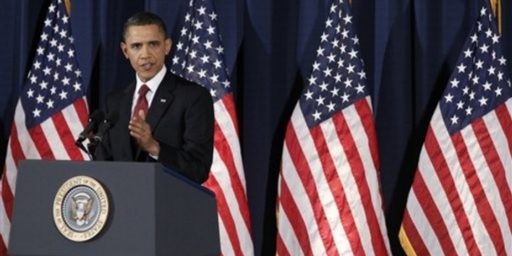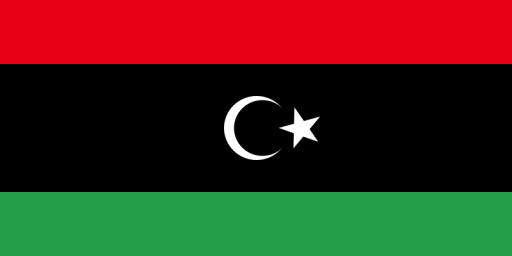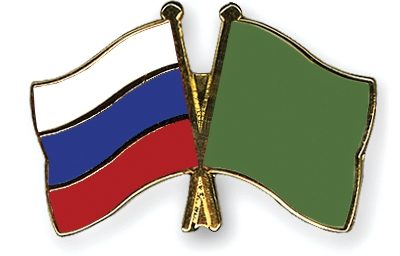Syria and the Do Something Syndrome
Ousting evil dictators is harder than it looks.
Marc Lynch makes a shrewd point on the calls to “do something” about the awful mess in Syria:
As the violence in Syria grinds on with no resolution in sight, a chorus of voices is predictably rising demanding that the Obama administration do more to hasten the exit of Bashar al-Asad. Their impatience is understandable, as is the outrage which I share about the indiscriminate use of violence by an ugly regime. But Syria will not be solved by Obama deciding to finally use the magic democracy words that he has inexplicably refused to deploy: “Expellus Assadum!”
The administration is right about the limits of Washington’s influence over events in Syria and correct to resist pressure to indulge in symbolic gestures such as withdrawing the Ambassador or calling on Asad to leave. Prudence is not weakness. It is the only rational response to the turbulence and uncertainty surrounding Syria today. That does not mean doing nothing. The Obama administration should continue to ratchet up its rhetorical condemnation of Syrian violence. It might use the threat of International Criminal Court referral and targeted sanctions to encourage regime defections. But increasing pressure is not enough. Instead, it should continue to focus on a regional and international approach, in cooperation with regional partners such as Turkey, Qatar, Saudi Arabia, and the Arab League, designed to create a real alternative to the seemingly unstoppable descent into brutality and rebellion.
Now, the Obama administration has brought some of this on themselves by framing the Libya operation in terms of a Responsibility to Protect innocents from tyrants.
In the face of the world’s condemnation, Gaddafi chose to escalate his attacks, launching a military campaign against the Libyan people. Innocent people were targeted for killing. Hospitals and ambulances were attacked. Journalists were arrested, sexually assaulted, and killed. Supplies of food and fuel were choked off. Water for hundreds of thousands of people in Misurata was shut off.
As I noted at the time, Gaddafi’s atrocities, “While horrendous … were hardly unprecedented. Other leaders in the Middle East and Africa are doing much the same without international military intervention.” That’s coming into greater focus now in Syria where, by almost every measure, the oppression is worse.
But the fact of the matter is that Obama judged Libya to be the easier fight and one that could be done without much cost to the United States. Clearly, he’s calculated that military options in Syria are less attractive.







I suspect part of the reason we are soft-pedaling Syria has to do with extraordinary renditions. The Syrians surely have some very interesting video of torture carried out on at least one Canadian citizen, and presumably other prisoners of other nationalities, on behalf of the United States. It’s hard to condemn the torturers you yourself employed.
Greetings:
Recently, I went back through Samuel P. Huntington’s “The Clash of Civilizations…” to see how well his ideas were holding up 15 years ot so after he sent them off to the printers. One of his gems, toward the back of the book, was his advice to avoid involvement in internecine Muslim conflicts. Made a lot of sense to me, but perhaps President Obama’s administration hasn’t gotten that far along in the book.
I have a disturbing concern about Muslim gratitude. To me, it’s like a Missouri/Warhol River; a mile wide, an inch deep and lasting for about 15 minutes. Engagement or involvement is not always the answer. As Fouad Ajami has pointed out, those are the lands of “I against my brother; my brother and I against our cousin; my cousin, my brother and i against the stranger.
For God’s sake, the members of one of history’s major imperialistic/colonialistic enterprises are still going on about the Crusades.
if i am doing the cost benefit analysis for the administration (granting a predilection for intervention, which i personally do not hold), i have to say i would come to the same conclusions. the libyan situation entails certain factors that syria’s simply lacks. the big differences in my eyes are the absence of both natural resources and a regionally powerful benefactor.
11B40:
I don’t think gratitude has much to do with it. I think the hope is we’ll end up with a less despotic, less adventurous regime. As always our underlying goal is stability. If all goes well we may have moderately stable, somewhat democratic regimes across much of north Africa. (Which is not to say we’ll get Vermont in Libya.)
I don’t know whether to laugh or cry at this. Because it worked so well in, say, Tibet?
So, how do we deal with the cognnitive dissonance caused by the same people tweeting do something concurrently calling for cutting the defense budget?
If “international support” is defined as “UN Security Council approval”, we’ll never get it for action against Syria. The Russians will never stand for it. Syria is too close an ally.
eh, come on charles. we dont need to spend more than the rest of the world combined to maintain the ability to project power and influence, nor do i see many calls for direct military action against syria. it seems to be targeted sanctions and increased pressure on saudi arabia, qatar, et al to ‘do something’. debate the notion to your heart’s content, but i dont see a ton of cognitive dissonance here.
avoid involvement in internecine Muslim conflicts
How about just avoiding internecine conflicts, period? Damn.